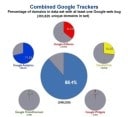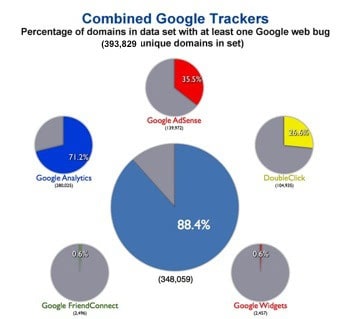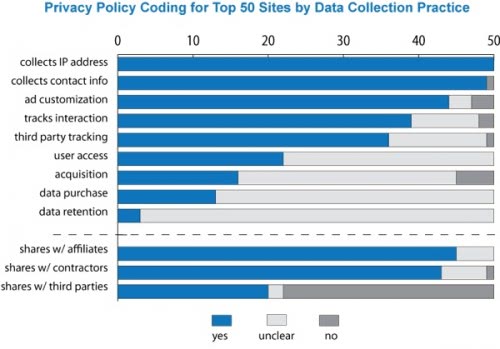Internet Privacy Study

Three researchers of the UC Berkeley School of Information have published results of an Internet privacy study that analyzed web privacy, data collection and information sharing on today's Internet.
Interested users can download the full Internet privacy report from the project's website or view the majority of its findings directly on the website.
The researchers analyzed the four main areas consumer complaints, web bugs, privacy policies and affiliate, and divided results into key findings, recommendations and methodology.
There is also an introduction that provides you with background information about the research project and an analysis of the Internet's top 50 websites.
Some interesting findings of the Internet privacy study reveal that Google can track users on 92 of the 100 most visited websites on the Internet and still 88% of a total of 393,829 analyzed distinct domains. The high percentage is a combination of services owned by Google including Google Analytics, Google Adsense and DoubleClick to name a few.

Microsoft was the company on the second place with an appearance on 60% on the top 100 websites followed by Omniture and Quantcast with 57%. A similar observation was made in the Privacy Policies analysis.
All sites that make up the top 50 sites of the Internet collect user data and at least 46 share that data with affiliates without disclosing who those affiliates are.
The majority on the other hand claim to offer no access to the data to third parties which can be confusing for the user as affiliates are usually seen as third party from the user's point of view.

The Internet privacy study draws a grim picture of the state of today's online privacy and there are not many options from a user perspective to avoid privacy issues.
One option is to avoid services that are known for confusing or problematic privacy policies, another to use anonymization software to avoid some forms of detection.
Advertisement


















@rruben – when one company can track ~90% of ALL internet sites there is always an issue of privacy. Remember, they willingly give up data to “fight terror” and for other undisclosed “noble” reasons. Has anyone actually read some of their privacy policies…. grab your tin foil hat….SPOOKY! :)
Bluetack has specific Microsoft and Google blocklists available but it makes web surfing painful with them enabled although it’s smoother in Linux vs Windows.
I use google analytics and adsense too and I can’t find any privacy problems. I can see in which city a visitor lives, but you just can’t link it to a person. Especially if you have a lot of visitors they are just flat statistics, nothing more.
So I don’t see any problems in gathering these stats.